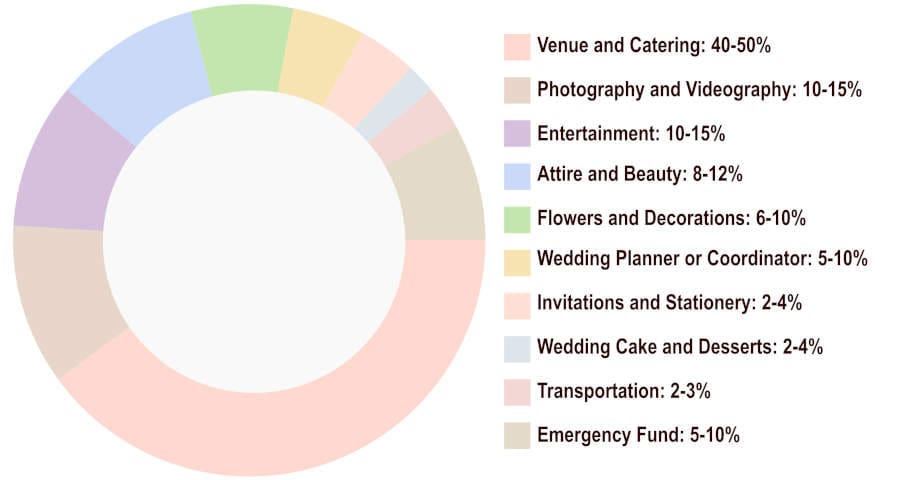Setting a wedding budget is one of the most crucial steps in planning your big day.
It helps you prioritise expenses, avoid overspending, and ensures that you allocate your funds to the elements that matter most to you.
Creating Your Wedding Vision

Creating a clear vision for your wedding is the crucial first step in effectively setting your budget. This vision not only outlines what you want your special day to look like but also determines which aspects are most important. For example, if a stunning venue or gourmet food is a top priority, you’ll know to allocate a significant portion of your budget to these areas.
For instance, a couple dreaming of a rustic, outdoor wedding with a focus on local, seasonal cuisine might allocate a larger portion of their budget to securing a picturesque venue and hiring a renowned caterer, while opting for simpler, DIY decor elements. Conversely, a couple who envisions a sophisticated urban wedding might invest more in a chic downtown venue and upscale decor, with less emphasis on elaborate catering.
A clear vision helps you prioritise the various elements of your wedding, which is essential for making informed budgeting decisions. With this prioritisation, you can strategically allocate funds and avoid overspending on less critical items that don’t enhance the overall experience.
Moreover, a well-defined vision is invaluable when communicating with vendors. It leads to more accurate quotes and services that align with your financial constraints. Vendors can better understand your priorities and offer tailored advice and options, ensuring that every element meets your expectations.
Additionally, knowing what you want from the beginning simplifies the entire planning process. You can quickly eliminate options that don’t align with your vision, saving time and reducing stress. This focused approach guarantees that every decision contributes to a wedding that truly reflects your personal taste and desires.
If you’re ready to start shaping your wedding day, check out our detailed guide on How to Create Your Wedding Vision to inspire and organise your ideas.
Setting Your Wedding Budget

After envisioning your perfect wedding, the next crucial step is to establish a realistic budget to ensure that your special day unfolds without financial stress.
- Begin with the Big Picture: The article starts with the importance of visualising the wedding to understand the associated costs. It encourages aligning the envisioned day with financial realities to form a practical budget.
- Establish Your Priorities: It’s crucial for couples to discuss their visions and financial situations to agree on what aspects of the wedding are most important. This includes deciding which elements to prioritise in the budget, such as venue, food, or photography.
- Establishing Your Budget: The piece outlines steps for setting a budget by considering personal finances, potential contributions from family and friends, and the impact of the wedding costs on other life goals. It stresses the importance of having a realistic spending limit that aligns with both partners’ comfort levels.
- Research Costs: Understanding local and seasonal pricing variations is essential. The article suggests doing thorough research to get a realistic picture of potential costs, which helps in making informed decisions about where to allocate the budget.
For a more detailed guide about setting your wedding budget then read my article on: Setting Your Wedding Budget.
Once you have worked through your budget and determined the total amount you plan to spend, the next step is to effectively allocate your funds across different aspects of your wedding.
Wedding Cost Breakdown: Allocating Your Budget

Once you have worked through your budget and determined the total amount you plan to spend, the next step is to effectively allocate your funds across different aspects of your wedding.
This process involves dividing your total budget into categories that cover all the essential elements of your big day.
Typical wedding expense categories include:
- Venue and Catering: This is often the largest portion of your budget, encompassing the cost of renting a space and providing food and beverages for your guests.
- Photography and Videography: Capturing the memories of your special day is crucial, so allocating sufficient funds for quality photography and videography services is important.
- Attire: This category covers the cost of wedding attire for the couple, including the wedding dress, tuxedo or suit, and accessories.
- Entertainment: Music and entertainment help create the ambiance for your celebration, so consider the costs of hiring a band, DJ, or other performers.
- Decor and Flowers: From centrepieces to bouquets, your decor and floral arrangements play a significant role in setting the tone for your wedding.
- Stationery and Invitations: This category includes the cost of save-the-dates, invitations, programs, and other printed materials.
By breaking down your total budget into these specific categories, you can ensure that you’re allocating your funds in a way that aligns with your priorities and wedding vision.
This approach also helps you stay organised and on track throughout the planning process, making it easier to manage your expenses and avoid overspending.
For a more in-depth look at how to allocate your wedding budget effectively, check out our guide on Wedding Cost Breakdown.
Who actually pays for the wedding?

Historically, the bride’s family was traditionally responsible for most of the wedding costs, a practice stemming from times when marriages were viewed more as alliances between families than simply a union of two individuals. This often meant that the bride’s parents hosted and financed the entire celebration.
However, as society has evolved, so too have wedding traditions, and many couples now emphasise making their wedding day uniquely theirs. This extends to how the wedding is financed.
As a result, there’s no strict rule for who pays for what wedding expenses. The approach to financing a wedding varies greatly among couples, influenced by personal choices and circumstances.
For a deeper exploration of how wedding costs are distributed today, and to understand what people traditionally pay for, be sure to read our detailed article: Who Actually Pays for the Wedding?
Planning a Wedding on a Budget

It would be wonderful if you could bring your vision of the perfect wedding to life without ever having to worry about costs.
However, the reality for most people is that budgeting is an essential part of wedding planning that cannot be overlooked.
Balancing the dream of a perfect wedding day with practical financial considerations is not just about achieving your desired outcomes, it’s also important for maintaining the health and future of your marriage from the very beginning.
Having a budget and sticking to it doesn’t mean your wedding will be any less wonderful. In fact, it can lead to a uniquely special and memorable day, creatively tailored to reflect what truly matters to you and your partner, making it all the more meaningful.
For more thoughts and ideas on planning your wedding within a budget, be sure to read my detailed guide, Planning a Wedding on a Budget
Typical Wedding Expenses

While you need to determine the total budget for your wedding, understanding the types of expenses you’re likely to encounter can empower you to make informed decisions and avoid unexpected costs.
Knowing the potential costs of each element of your wedding helps you tailor your budget more accurately, ensuring that your resources are effectively allocated to bring your vision to life.
For a comprehensive overview of what you might expect to spend on everything from your reception to attire, along with tips on how to manage these costs, dive into our detailed guide: Understanding Typical Wedding Expenses.
Tracking expenses

Weddings can be expensive, and it’s easy for costs to get out of hand if you’re not careful. Keeping track of every expense is crucial to stay within your budget and avoid financial stress.
If you don’t maintain a clear record of your spending, you might not realise you’ve exceeded your budget until it’s too late. This oversight can lead to stressful surprises, particularly when it comes time to make final payments.
By monitoring your expenses, you can identify issues early and adjust your plans as needed. This proactive approach helps you manage your finances better and prevents the stress of unexpected bills as your wedding day approaches.
A detailed spreadsheet is one of the most effective tools for keeping track of wedding expenses. That’s why I created a template in Excel and Google Sheets that lets you input estimated costs versus actual expenditures, maintain an itemised list of all wedding-related spending, and easily see where your budget stands at any moment.
You can download this helpful template from: Your Essential Free Wedding Budget Template.
Embrace Communication

Effective communication is crucial in wedding planning, not only between you and your partner but also with vendors and financial contributors. It plays a key role in preventing misunderstandings that could lead to budget mishaps or unexpected expenses.
Start by regularly checking in with your partner about the budget and planning progress. Promptly addressing any concerns or changes ensures you both remain aligned and informed.
Clarity is vital when dealing with vendors. Engage in detailed discussions about the services they will provide and the total costs involved. It’s important to fully understand what their packages include and, just as crucially, what they don’t.
Insist on written contracts with vendors. These should clearly outline the services, payment schedules, and any other financial commitments. Having everything in writing helps to prevent future disputes or misunderstandings.
Clear conversations with family members or friends who are contributing financially are also essential. Determine the nature of their contributions, identifying if they are gifts or loans, and understand if they come with any specific expectations.
Decide on the level of involvement your financial contributors will have in the planning process. While their support is invaluable, setting boundaries is important to ensure their involvement doesn’t conflict with your wedding vision.
Keep all involved parties updated on the budget and any changes that occur. Communicating adjustments or fund reallocations helps manage expectations and avoid last minute surprises.
Finally, maintain openness to negotiation and flexibility, especially with vendors and financial contributors. If unexpected costs arise, honest conversations can often lead to solutions that are agreeable to everyone involved.
Remember the Aftermath

In wedding planning, it’s essential to balance the excitement of the day with the impact on your long-term financial goals. A wedding is an important milestone, but it’s just the beginning of your life’s journey together. Prioritising your future financial stability is crucial.
Think about what comes after the wedding. Are you saving for a house, planning extensive travel, or starting a family? These long-term aspirations should shape your wedding budget, helping you avoid overspending for a single day’s celebration.
Remember, a beautiful wedding doesn’t necessarily mean a lavish one. It’s about focusing on what truly matters to both of you. By exploring cost-effective options and prioritising key elements, you can have a memorable day without compromising your financial health.
The goal is to start your married life on a solid financial footing. Sticking to a well-planned budget and spending within your means will help you avoid post-wedding financial stress, setting you up for a future filled with possibilities and free from the burden of excessive wedding debt.

